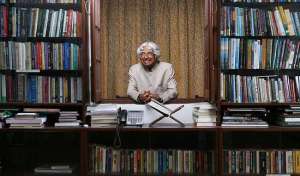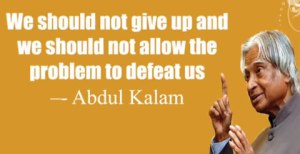by Dorairaj Nadason Executive Editor. The Star
Dr APJ Abdul Kalam was not a politician, but he was a true leader of men and a great success story. He was a poor kid who became a role model for leaders around the world.
THE VVIP walked to the stage to loud applause, flanked by the hosts. He passed the speaker’s podium. And stopped in his tracks. There, before him, were two rows of seats with a special chair in the centre for him, comfortable cushions and all.
The man flatly refused to move unless the chair was removed.“Get me a chair just like the others,” he demanded.The hosts were flustered. They rushed around before deciding to remove the comfortable chair and place one of the other chairs there instead.
Placated, the VVIP walked over, raised his hands to the crowd and sat. And the crowd rose as one to give Dr Avul Pakir Jainulabdeen Kalam a standing ovation.
Dr APJ Abdul Kalam, who died on July 27, was that kind of man – a humble leader who always considered himself one of the millions of ordinary Indians.
He was no ordinary man, though. He has even been compared with Mahatma Gandhi, the man behind India’s independence and the great movement called satyagraha (passive resistance) and ahimsa (non-violence).
Like Gandhi, he owned precious little but for most Indians of today, he was the most precious thing in the country. He was scientist, philosopher, poet, leader, teacher, medical researcher, missile man – and, above all, the People’s President.
When Dr Kalam was made President, he went into Rashtrapati Bhavan, the presidential palace, with two bags of clothes. Five years later, his tenure done, he left the palace – with the same two bags.
Aides tell of how he used to wear the same few coats and shirts – some were frayed – although he was asked to buy new ones. To his death, he owned little. He had some 2,500 books, a wristwatch, six shirts, four trousers, three suits and a pair of shoes. He did not own property. Not even a fridge, TV, car or air conditioner.
He survived on the royalties from his books – he authored four of them – and his pension. He did not believe in accepting money from anyone. And his penchant was in driving this message home to the youths of India.
“If you know your father bought that car with money that he did not rightfully earn, tell him that you will never sit in the car. And stick to your words,” he said.He wanted them to walk or cycle rather than ride in a car bought with ill-gotten wealth.
He said if society was to be fighting corruption, there were three key people who could make it happen – the father, the mother and the teacher. And he was the teacher.
He told youths to dream, not idle dreams, but dreams that would come true. Dreams, he said, are not what you see when you are asleep. They are what keep you from sleeping.
He was a devout Muslim – the son of an imam – but also a man who embraced all religions.
Born in Rameshwaram, an island in the southernmost tip of India, he grew up with the famed Ramanatha Swami temple towering over him. His best friend was Ramananda Shashtri, the son of a Hindu priest.
For great men, he said, religion was a way of making friends. “Small people make religion a fighting tool,” he said. And he lived up to his doctrine.
During his visit to Malaysia, he walked the street of harmony – Jalan Kapitan Keling – in Penang. At St George’s Church, he stood in front of the cross and recited a prayer. At the Kuan Yin temple down the road, he prayed with joss sticks in his palms. Then, he walked over to the Sri Mahamariamman Temple where he paid his respects.
As he stepped out to loud Indian traditional music, the crowd mobbed him. He took the mike and told the crowd in his native Tamil language to recite after him his favourite mantra. And, with a fervour seldom seen there, they chanted:
If there is righteousness in the heart, there is beauty in the character;
If there is beauty in the character, there is harmony in the home;
If there is harmony in the home, there is order in the nation;
If there is order in the nation, there is peace in the world.
Then, it was over to the Kapitan Kling mosque where he was greeted by the imam. He planted a tree – tree-planting to stop global warming was another great drive of his – and then joined a congregation of fellow Muslims in zohor prayers.
It was a lesson in harmony, on Harmony Street.He may have been the man behind India’s killing machines, its rockets and bombs. But he was a man who loved every soul as his own. The only sad thing is: he was never an elected leader, one who could have made a difference in politics and policies. He was just a titular head of state.
But Dr Kalam died every inch a statesman, and as a role model for those in public life throughout the world. Even in death, he left a memorable legacy. Don’t declare a holiday on my death, he said.
“If you want to remember me, work an extra day,” he said.In Jaipur, not only did they not have holiday on the day he died, all civil servants came back to work last Sunday to honour his words.
Dr Kalam may not have wanted a holiday upon his death but there are days for him. In Switzerland, May 26 – the day he visited the country – is World Science Day. And his birthday on Oct 15 is World Students Day. He was a teacher to his last breath.






No comments:
Post a Comment
Note: Only a member of this blog may post a comment.